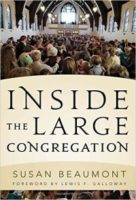On airplanes, adults are told to put their masks on before helping others so they will be fully conscious. In churches, adults need to attend to their own spiritual consciousness before they can ably assist children and youth with faith formation.
Unfortunately, the way we structure our staff teams reinforces semi-conscious adult faith formation. We follow time-honored traditions of staffing faith formation in children and youth first. Then we staff the needs of the organization. We give left-over oxygen to our adults. Can we really “train up a child in the way he should go,” when the quality of adult faith formation is so far behind the quality of our children and youth programs?
What follows is a description of the traditional order in which staff teams are assembled. As money becomes available in the church budget, staff positions are added in response to felt need. As we make these additions we often misdiagnose the real need. Can you spot the misguided assumptions in the following progression?
Traditional staffing order
After we fund the position of senior minister and musical director, we turn our attention to the youth ministry of the church. We take whatever funding we can muster and we hire the brightest, shiniest, most fun-loving youthful leader that we can get out hands on. Why? Well of course, our teenagers are our future. If we don’t handle them correctly in their teen years, we will lose them forever. They don’t want to spend time with their parents as teachers. We need an outside professional.
After the youth have been attended to, we focus on raising a budget that will support the hire of a children’s director. Why? Well, if we don’t attract families with young children, we won’t have anyone to feed into our spectacular youth program. And besides, our parents are exhausted and can’t be expected to invest in the coordination of a children’s program. A staff member who will devote themselves to the spiritual nurture of our children seems like a no-brainer.
Now we become painfully aware of the unmet needs among the most senior members of our community. They are wondering why no one cares enough to invest in them. Our pastor is overwhelmed by the health care crisis of congregants and all of the unplanned funerals. So, we find a retired pastor who can visit the aged and infirm, help with funerals and tend grief. After all, pastoral care is the primary spiritual formation need of the senior adult community, right?
Next, somebody notices that we are becoming too internally focused. There is a excessive navel gazing and we determine that it is time to get outwardly focused, develop more of a social justice platform, and organize our disjointed missional efforts. A director of outreach and mission satisfies the itch.
This is followed by the realization that adult congregants are misinformed and disengaged. We hire a communications director and then a membership director, and so on and so on, until finally the senior minister throws up his hands. “I can’t manage all of these people!” We really need someone on the program team who can supervise others. And by the way, we really should have someone on staff that takes responsibility for adult spiritual formation.
So, we hire a senior associate minister, put them in charge of supervising children and youth programming, ask them to help with preaching and pastoral care, and use their remaining available time to design a program of adult faith formation.
What message do we send when every felt need of the church is staffed before we tend to the faith formation of adults? We are reinforcing a number of mistaken assumptions that work against the health of our congregations.
Our Mistaken Assumptions
Faith formation is about knowledge: Once you have the knowledge, you’re done cookin’. We talk about the spiritual life as a journey, but we act as if it were a destination. For all practical purposes, faith formation ends with confirmation in most of our congregations. We assume that adults have learned what they need to know, and that daily faith walking is about re-applying the basic principles learned in childhood.
In fact, we know that many of our adults have not had basic faith training. They don’t know the Scriptures, they aren’t comfortable with prayer, and they don’t understand discernment or the basic spiritual disciplines. And yet we choose to staff every other need of the church before we staff adult faith formation.
Faith is taught, not caught. When our congregations emphasize children and youth over adult ministry, we end up encouraging parents to drop their kids off and take some time off. We teach them, by our own example, that faith formation is handled by the professionals and that their job is to get the kids to the professionals for instruction.
In fact, research shows that authentic faith is caught, not taught. What we teach at church is only secondary to the lived experience at home. Why don’t we choose to shore up the adults in the lives of our children, with their own vital faith experience?
We don’t need to hire staff for adult faith formation, because this is what the senior minister does. Most senior pastors would love to facilitate faith formation among adults. If they are honest, they simply don’t have the time. About a third of the senior pastor’s time goes into orchestrating worship and preaching. About a third goes into the oversight of staff and general administration with boards and committees. The remaining third has to cover pastoral care, social justice, community involvement, and everything else. That doesn’t leave much time for adult faith formation.
Why staff it, when they won’t come? Adult Sunday school has all but disappeared from many congregations. We have tried all kinds of replacement gimmicks and approaches. And we are met with continued apathy. Why invest in a losing battle until someone figures out what the new education medium is for adults?
In fact, the “spiritual but not religious” movement is finding expression everywhere but in the church. People make a regular commitment to tune into the OWN network on Sunday mornings to watch Oprah Winfrey interview great spiritual thinkers and writers. They find yoga studios that offer meditation experience. They join book clubs to read the spiritual classics. Others are finding a way, why aren’t we?
What if we reversed our typical staffing patterns and invested first in the spiritual formation of adults in our community? Might that make a difference in the overall health of the congregation, and in the spiritual well-being of our children and youth?
Susan Beaumont is a coach, educator, and consultant who has worked with hundreds of faith communities across the United States and Canada. Susan is known for working at the intersection of organizational health and spiritual vitality. She specializes in large church dynamics, staff team health, board development, and leadership during seasons of transition.
With both an M.B.A. and an M.Div., Susan blends business acumen with spiritual practice. She moves naturally between decision-making and discernment, connecting the soul of the leader with the soul of the institution. You can read more about her ministry at susanbeaumont.com.



